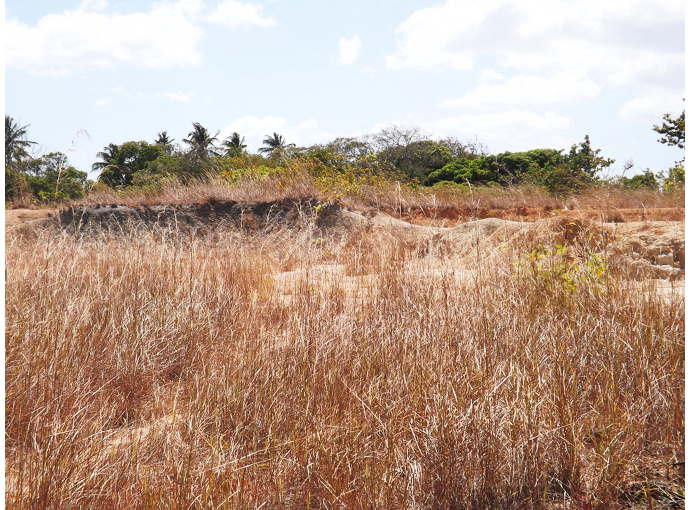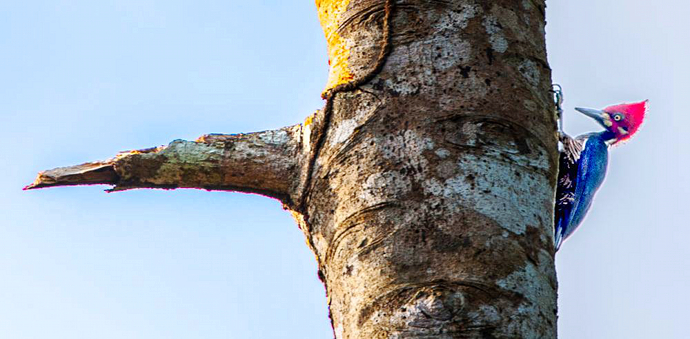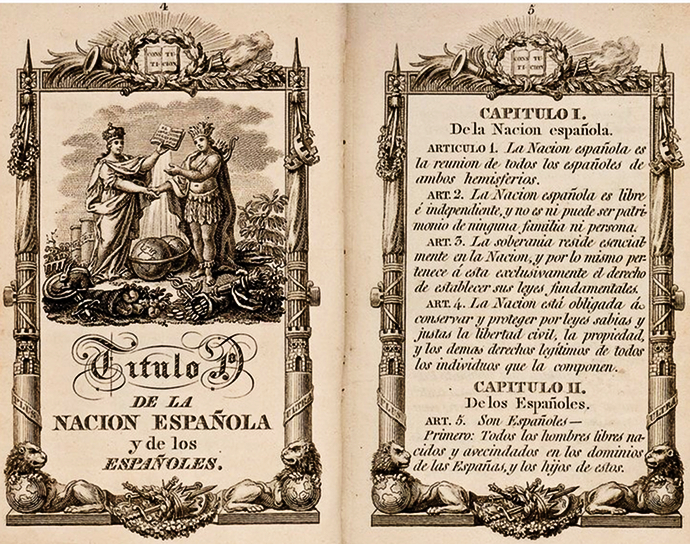Por conmemorarse el 19 de marzo un aniversario más de La Pepa.
La Constitución de Cádiz
por Olmedo Beluche
Uno de los pasajes menos conocidos del proceso social y político que derivó en la Independencia de Hispanoamérica ha sido la convocatoria y discusión de las Cortes de Cádiz (1810-1812), que redactaron la Constitución Política que lleva el nombre de esta ciudad, y que históricamente ha sido llamada “La Pepa”, por haber sido proclamada el 19 de marzo de 1812, día de San José. La Constitución de Cádiz fue la reordenación institucional más liberal del sistema político español, aunque se quedó a medio camino entre el absolutismo y el liberalismo consecuente, llegó tarde para evitar la Independencia, y tal vez la propició con sus medidas discriminatorias contra los americanos, además, tuvo una vida efímera, dada la resistencia de Fernando VII a ver limitados sus poderes.
La Constitución de Cádiz fue la primera constitución política moderna de Hispanoamérica. Lleva el nombre de esa ciudad porque en ella se reunieron, el 24 de septiembre de 1810, los diputados de las Cortes para redactarla debido a que el resto de España se encontraba bajo la ocupación militar francesa. Esta Constitución fue proclamada el 19 de marzo de 1812, y en ella se estableció un sistema político basado en una Monarquía constitucional, división de poderes del Estado, y garantías democráticas como la libertad de opinión, de imprenta, el debido proceso judicial, etc. La Constitución de Cádiz tuvo una vigencia corta, pero su influencia se percibe en las constituciones políticas españolas e hispanoamericanas, posteriores a la Independencia.
La ocupación francesa y la convocatoria a las Cortes de Cádiz
A partir de la ocupación francesa empieza un proceso revolucionario en toda España y América en el que, bajo el ropaje de resistencia al invasor y la defensa de Fernando VII como legítimo rey, se producen sublevaciones populares (como la del 2 de Mayo en Madrid), guerra de guerrillas y el surgimiento de nuevas formas de autogobierno municipal (Juntas) que, en el fondo eran la revolución burguesa española porque implicaban la ruptura del régimen absolutista precedente. Estos sucesos son conocidos en la historia de España como la “Guerra de la Independencia”.
Guerra que se extiende en dos fases. En la primera, el verano-otoño de 1808, en la que diversas ciudades y regiones se insurreccionan contra la ocupación francesa dirigidas por las Juntas de gobierno y fuerzas militares locales, sin coordinación nacional, pero que asestan importantes derrotas a los ocupantes. En la segunda, a partir de noviembre de 1808, hasta enero de 1809, Napoleón en persona asume las operaciones en España y al frente de la Grande Armeé (250.000 soldados) logra consolidar la ocupación.
En un principio el Consejo de Castilla, un organismo tradicional de la monarquía, en agosto de 1808, llama a desconocer las Abdicaciones de Bayona y convoca una reunión de las Cortes Generales, bajo el criterio tradicional del organismo estamental. Pero las Juntas Provinciales, encabezados por la Junta de Sevilla, organismos novedosos y revolucionarios, en choque con el Consejo de Castilla, exigen una convocatoria a Cortes rompiendo el criterio tradicional, y exigiendo que la representación atendiera a criterios demográficos y regionales. De esta manera, el 25 de septiembre de 1808, se instala en Aranjuez la Junta Central Gubernativa del Reino, intentado sostener un gobierno central contra la ocupación. Pero la Junta Central tuvo que moverse a Sevilla ante el avance de Napoleón y luego refugiarse en Cádiz a fines de 1809.
Pese a que el Consejo de Castilla había convocado a las Cortes desde agosto de 1808, y que la Junta Central había ratificado la convocatoria en septiembre de 1809, los vaivenes de la guerra y las disputas internas sobre el carácter de las Cortes y la forma de la representación retardaron su convocatoria formal hasta el 1 de enero de 1810, cuando la Junta Central dio paso a un gobierno constituido bajo el nombre de Consejo de Regencia cuyo contrapeso serían las propias Cortes.
“Desde este momento, españoles americanos, os veis elevados a la dignidad de hombres libres; no sois ya los mismos de antes, encorvados bajo un yugo mucho más duro, mientras más distantes estabais del centro del poder, mirados con indiferencia, vejados por la codicia y destruidos por la ignorancia. Tened presente que al pronunciar o escribir el nombre del que ha venir a representaros en el Congreso Nacional, vuestros destinos no dependen ya de los ministros, ni de los virreyes, ni de los gobernadores: están en vuestras manos”, dice el Consejo de Regencia desde Cádiz.
Esa convocatoria es la que dispara en América el proceso independentista, pues en ella, además de pedir que se enviaran delegados, se exhorta a crear en las capitales virreinales y capitanías generales Juntas de Gobierno con participación de los criollos como iguales en derechos ciudadanos que los peninsulares. Derecho éste que había sido negado hasta ese momento por las leyes de la monarquía absoluta, que había establecido un sistema de castas en las colonias en la que los únicos con plenos derechos políticos lo eran los nacidos en la Península Ibérica. Agudizó el conflicto en las ciudades americanas el hecho de que los virreyes intentaran ocultar la convocatoria del Consejo de Regencia, para no compartir el poder político con las Juntas que se proponían.
Esto motivó las primeras sublevaciones populares que desplazaron por la fuerza a los virreyes y gobernadores (a lo largo de 1810), e impusieron las Juntas de Gobierno criollas, todas jurando en un principio lealtad a Fernando VII y al Consejo de Regencia. Pero las victorias de las Juntas fueron relativas, ya que sectores realistas o absolutistas del ejército se hicieron fuertes en diversas ciudades y regiones, con lo que también se radicalizó el proceso en las ciudades que, un año después (1811), en medio de guerras civiles llevó al poder a sectores más radicales de capas medias que sí proclamaron la independencia completa de España. El estado de guerra civil se mantuvo aún bajo la restauración de Fernando VII (1814).
Un motivo de discordia, lo fue el hecho de que la convocatoria a estas Cortes se basó en el desigual criterio de que cada provincia peninsular tendría dos delegados, mientras que los Virreinatos y Capitanías se les pedía enviar un delegado. Esa resistencia de los españoles peninsulares, incluso los más liberales, a reconocer la completa igualdad a los españoles americanos se va a mantener durante los propios debates de las Cortes de Cádiz y se va a formalizar en la propia Constitución emanada de ellas. Esta actitud reforzará políticamente a los radicales independentistas de este lado del mar y debilitará a los moderados que pudieron sentirse cómodos con una monarquía constitucional.
Las reformas políticas de la Constitución de 1812
Su Artículo 1 define: “La Nación española es la reunión de todos los españoles de ambos hemisferios”, con lo cual deja abierta la posibilidad de salvar la integridad del Estado y evitar la Independencia de Hispanoamérica. Pero, como se ha dicho antes, llegó tarde, pues un año antes de su proclamación ya se había avanzado en la independencia absoluta en lugares como Caracas, Bogotá, Cartagena, México (con Hidalgo, aunque no formalmente), etc. Su Artículo 5 establece que son españoles: “Todos los hombres libres nacidos y avecinados en los dominios de España, y los hijos de éstos”; “los libertos desde que adquieran la libertad en las Españas”; lo cual reconoce a los criollos y mestizos la nacionalidad, pero no a los negros esclavos que eran muchos.
Sin embargo, al fijar la ciudadanía se hicieron las siguientes distinciones: “aquellos españoles que por ambas líneas tienen su origen en los dominios españoles de ambos hemisferios” (Art. 18); “A los españoles que por cualquier línea son habidos y reputados por originarios del África, les queda abierta la puerta de la virtud y del merecimiento para ser ciudadanos: en consecuencia las Cortes concederán carta de ciudadano a los que hicieren servicios calificados a la Patria, o a los que por su talento, aplicación, y conducta, con la condición de de que sean hijos de legítimo matrimonio de padres ingenuos; de que están casados con mujer ingenua, y avecinados en los dominios de las Españas, y de que ejerzan alguna profesión, oficio o industria útil con un capital propio” (Art. 22). Respecto al derecho al voto para escoger diputados se agrega: “Esta base es la población compuesta de los naturales que por ambas líneas sean originarios de los dominios españoles, y de aquellos que hayan obtenido en las Cortes carta de ciudadano…” (Art. 29).
El ejercicio de la ciudadanía se suspendía en casos como, entre otros (Art. 25): “En virtud de interdicción judicial por incapacidad física o moral”; “Por el estado de deudor quebrado, o de deudor de los caudales públicos”; “Por el estado de sirviente doméstico”; “Por no tener empleo, oficio o modo de vivir conocido”; “Por hallarse procesado criminalmente”; “Desde el año mil ochocientos treinta deberán saber leer y escribir…”.
Esta definición de ciudadanía no podía ser satisfactoria para los españoles americanos, tal vez salvo para aristocracia criolla, porque (además de dejar por fuera a las mujeres, algo común en la época para todos los países) dejaba por fuera del ejercicio de la ciudadanía a la mayoría de los mulatos de América, no sólo a los negros esclavos. Algunos autores opinan que esta medida discriminatoria se debía al temor de los liberales españoles de que se vieran rebasados en número de diputados provenientes de América.
En plano político la Constitución de Cádiz avanzó mucho más, como en la limitación de los poderes del Rey, partiendo de los siguientes principios: “La Nación española es libre e independiente, y no puede ser patrimonio de ninguna familia ni persona” (Art. 2); “La soberanía reside en la Nación, y por lo mismo pertenece a ésta exclusivamente el derecho de establecer las leyes”; “El objeto del Gobierno es la felicidad de la nación, puesto que el fin de toda sociedad política no es otro que el bienestar de los individuos que la componen” (Art. 13); “El Gobierno de la Nación española es una Monarquía moderada hereditaria” (Art. 14); “La potestad de hacer las leyes reside en las Cortes con el Rey” (Art. 15); “La potestad de hacer ejecutar las leyes reside en el Rey” (Art. 16); “La potestad de aplicar las leyes en las causas civiles y criminales reside en los tribunales establecidos por la ley” (Art. 17).
En algunos aspectos sociales se registraron conquistas democráticas, como por ejemplo en el Capítulo III: se estableció las bases del debido proceso, se prohibió la tortura, la confiscación de bienes, el traspaso a la familia de las sanciones, la inviolabilidad del domicilio, etc. El artículo 339 estableció que “Las contribuciones se repartirán entre todos los españoles con proporción a sus facultades, sin excepción ni privilegio alguno”. El artículo 366 estableció la educación pública para enseñar a “leer, escribir y contar” a los niños. El artículo 371 estableció el principio de la libertad de opinión e imprenta.
La restauración de Fernando VII y el final de la Constitución de 1812
Retornado a Madrid, en mayo de 1814, Fernando VII ordenó la disolución de las Cortes y la suspensión de la Constitución de 1812. En Hispanoamérica, ese año marcó la contraofensiva del absolutismo español que derivó en la derrota de los sectores más radicales que luchaban por la independencia. La durísima represión desatada por las fuerzas de la restauración, liquidarían las esperanzas de conquistar espacios democráticos bajo una monarquía constitucional española. Con ello se preparó el camino para que Simón Bolívar volviera de su exilio y culminara la Independencia del continente entre 1819 y 1825.
La Constitución de 1812 habría de ver un nuevo resurgimiento en 1820, con un alzamiento militar de las tropas preparadas para marchar a América a aplastar los últimos focos de resistencia independentista, que exigió a Fernando VII someterse a ella. La sublevación inició cerca de Sevilla, el 1 de enero de 1820, dirigida por el general Rafael del Riego, cubrió Andalucía y Galicia, hasta que una explosión popular en Madrid el 7 de marzo, pone en jaque al rey. El día 10 de marzo, éste emite el “Manifiesto del Rey a la Nación”, por el cual proclama: “Marchemos francamente, y yo el primero, por la senda constitucional”.
Fernando juró de esta manera someterse a la Constitución de 1812, abriendo un periodo liberal de tres años. Pero era un juramento falso, pues conspiró con los gobiernos más reaccionarios de Europa, agrupados en la Santa Alianza, para acabar con la “monarquía moderada” y restaurar el absolutismo. El 7 de abril de 1823, un ejército francés al mando del Duque de Angulema, y con el apoyo de la Santa Alianza, invadió España y restituyó los poderes conculcados a Fernando. El general del Riego, al igual que otros, moriría ahorcado en noviembre de ese año y con él la Constitución de 1812.
Contact us by email at / Contáctanos por correo electrónico a fund4thepanamanews@gmail.com
To fend off hackers, organized trolls and other online vandalism, our website comments feature is switched off. Instead, come to our Facebook page to join in the discussion.
Para defendernos de los piratas informáticos, los trolls organizados y otros actos de vandalismo en línea, la función de comentarios de nuestro sitio web está desactivada. En cambio, ven a nuestra página de Facebook para unirte a la discusión.
~ ~ ~
These announcements are interactive. Click on them for more information.
Estos anuncios son interactivos. Toque en ellos para seguir a las páginas de web.



























